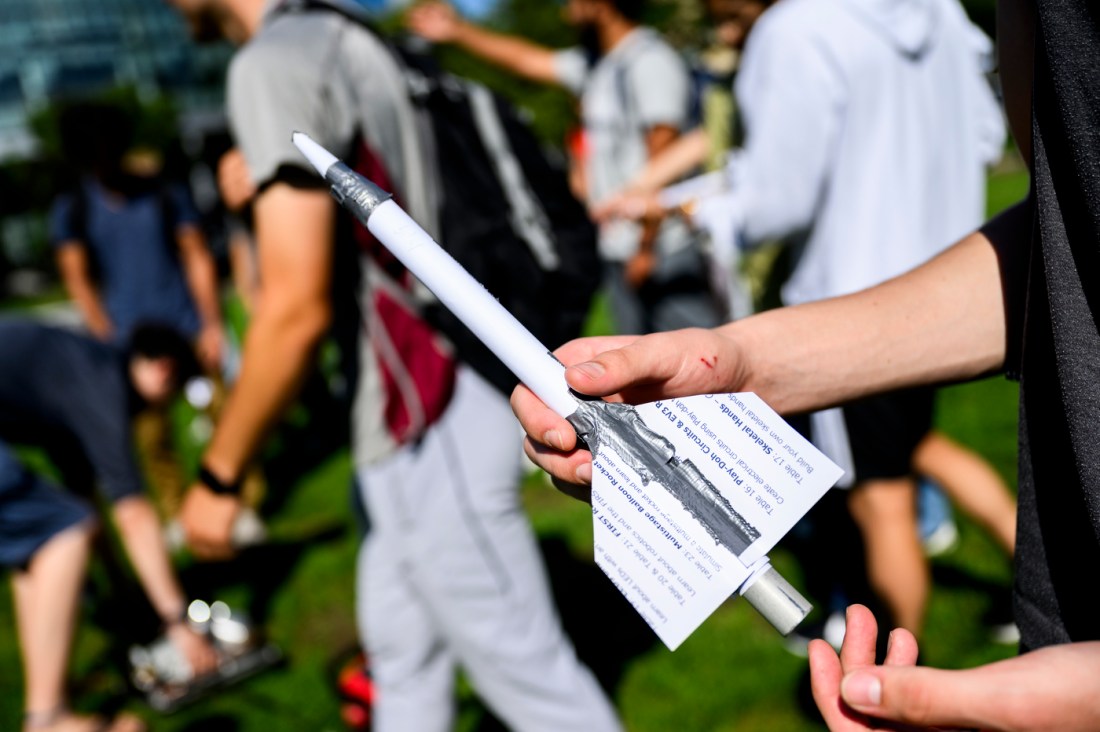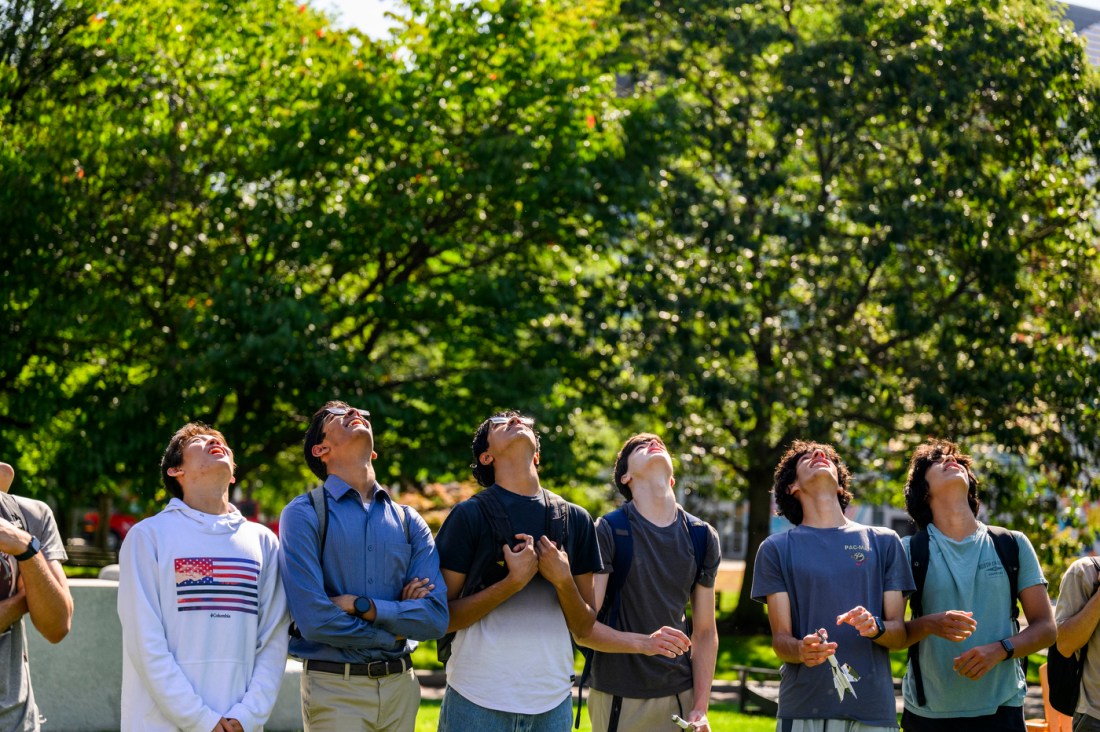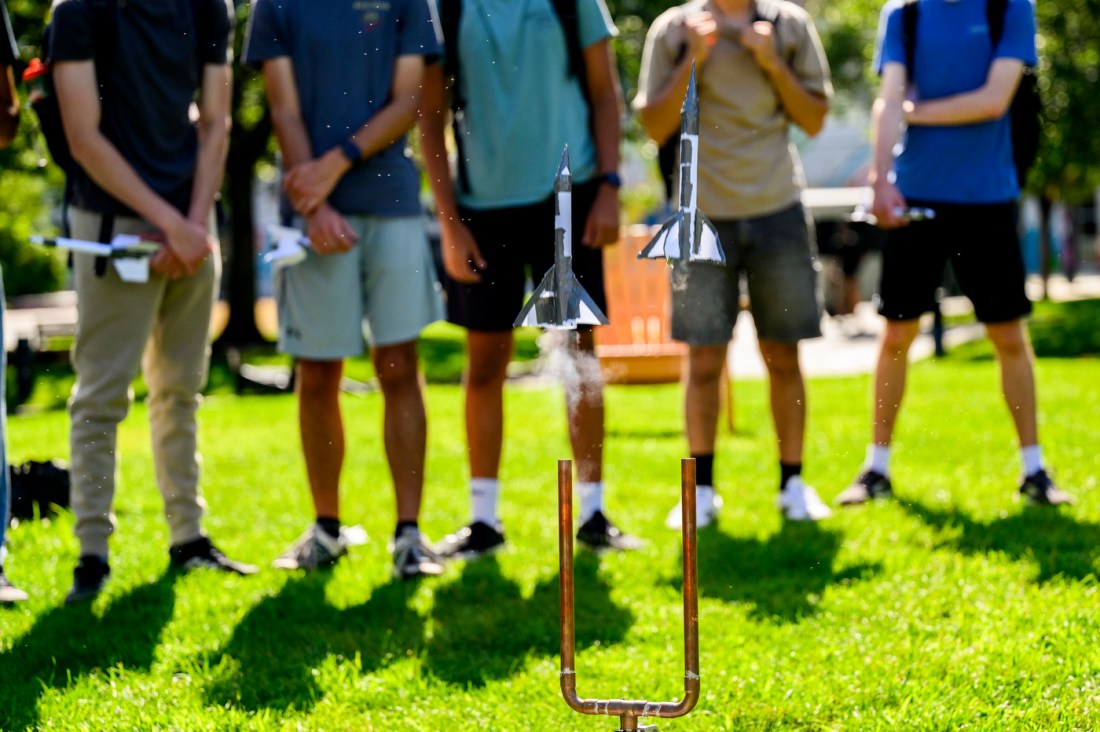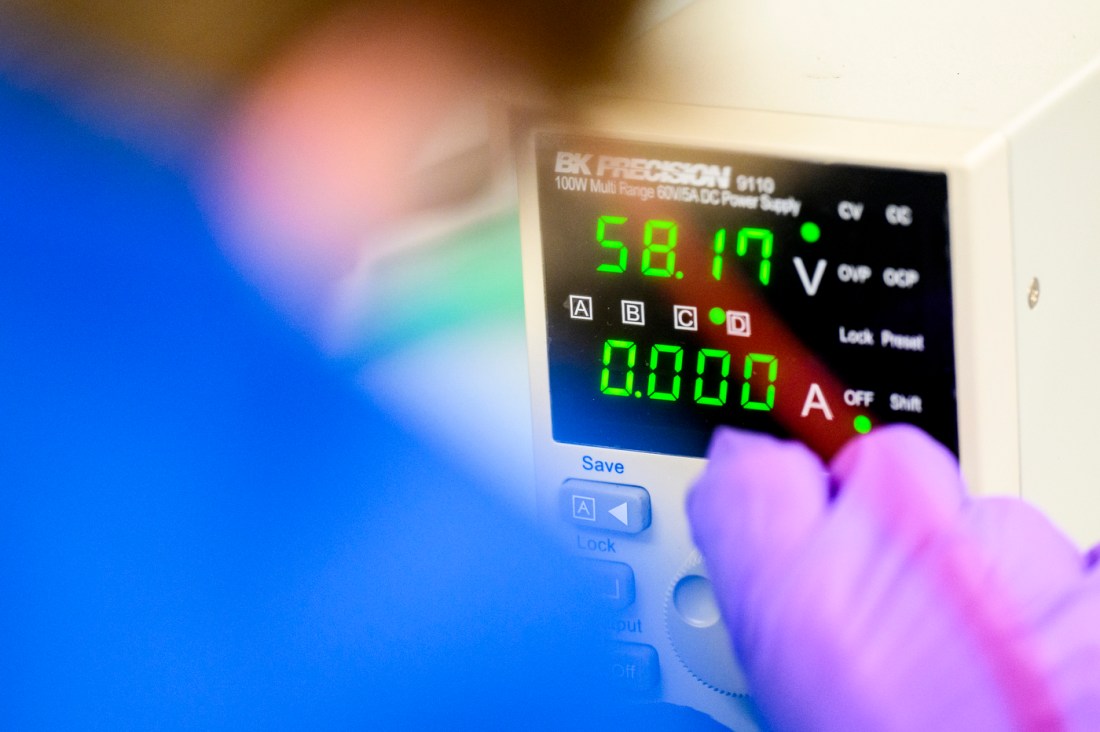Northeastern summer program inspires future STEM leaders through research and mentorship
Northeastern’s Young Scholars Program introduces high school students to career opportunities in science, technology, engineering and mathematics.

Shiza Hussain, a 17-year-old rising senior at Foxborough High School in Massachusetts, has long been drawn to the sciences and the challenges of climate change and water sustainability.
While taking advanced placement courses in physics and biology, she also dedicated her free time to advocating for public policies that address climate change.
This summer, participating in Northeastern University’s six-week Young Scholars Program, she discovered she can unite her academic interests with her passion for climate change in a future career.
“I can see myself here pursuing what I enjoy,” Hussain says.
The Young Scholars Program — offered free to Boston-area rising high school seniors interested in science, technology, engineering and mathematics — provides a rare opportunity for a hands-on academic research experience before college.
This year, Northeastern’s Center for STEM Education received an unprecedented number of applications — over 350 — and invited 32 students to participate in the program.
A launchpad for future scientists and engineers
The Michael B. Silevitch and Claire J. Duggan Center for STEM Education launched the Young Scholars Program in 1990 in response to a nationwide shortage of domestic students entering the sciences, math and engineering fields.
During the program, participants work in state-of-the-art laboratories on Northeastern’s Boston campus, attend faculty-led seminars and visit local organizations to see STEM in action.




“They’re a half-step away from going away to college,” says Claire Duggan, the center’s executive director. “So, this experience really does help them make that transition and make informed decisions.”
Beyond research, students take on fun engineering challenges, such as building an air-powered rocket, while developing skills and friendships. They also receive guidance on the college application process, professional development and many career pathways in STEM.
Faculty and student mentors
Over the years, many faculty members, graduate students and postdocs, Duggan says, have volunteered their time to host high school students in their labs.
“This is an opportunity for them to be able to explain difficult science concepts to younger audiences and to develop mentoring skills,” she says.
One of those mentors, Marvin Onabajo, professor of electrical and computer engineering at Northeastern, says he enjoys working with high school interns because they are highly motivated and bring fresh perspective to the research.
His lab specializes in analog and mixed-signal integrated circuit designs, or tiny electronic chips that combine both analog and digital signals and can be used in wireless communication or medical devices. Young Scholars in his lab typically design printed circuit boards, flat boards that connect electronic components with thin metal paths, and program microcontrollers to test their prototypes.




“The questions that they ask force you to think a little bit outside of your technical expertise in order to come up with general explanations, like for a broader audience,” he says.
Northeastern student facilitators, Duggan says, are also critical to the program’s success. They support scholars throughout the program, ensure everything runs smoothly in each lab and help coordinate faculty speakers.
Victoria Berry, 19, now studying mechanical engineering and math at Northeastern, was one of three student facilitators this summer. Two years ago, she was a Young Scholar herself, working on a research project involving machine learning and computer vision in infant health monitoring.
Editor’s Picks
“I actually continued the research that I did [at YSP] during my first year here,” she says. “This program had a pretty big impact on me, regarding what I was going to do in my future.”
Exploring sustainable water technology
Hussain was paired with Kian Nhuch, a 17-year-old student at Somerville High School, and placed in the lab of Akram Alshawabkeh, George A. Snell professor of engineering and university distinguished professor of civil and environmental engineering. Their research focused on electrochemical regeneration of activated carbon cathodes used to remove pollutants from water.
“Out of all the different labs that were available, this one was perfect for me,” Hussain says, because it combined her two passions — science and environmental issues.
The students experimented with carbon cathodes made with espresso grounds, using methylene blue — a dye of an intense blue color — as a model contaminant and an electrolyte solution.
“Our goal was to develop a method of portable, low-maintenance and sustainable water [purification] technology,” Hussain says.
Most physical filters, Nhuch says, trap pollutants but cannot be easily regenerated and often get discarded, reintroducing waste into the environment. Some filters can be heated to remove contaminants but the process is highly energy-inefficient.
“Our carbon cathodes for water filtration act as a solution both to pollution and towards the sustainability problem,” Nhuch says.
Using tools such as a UV-Vis spectrophotometer and FTIR spectrometer, they measured and analyzed the concentration of methylene blue in samples. They then ran regeneration experiments to restore the cathodes’ absorption capacity, applying electrical currents of 50 mA and 100 mA to see whether the contaminant would be released or electrochemically degraded.
“Over time, after these regeneration periods, we’re actually seeing an increased amount of efficiency from these carbon cathodes,” Nhuch says. “We saw that there’s no visible methylene blue in our electrolyte solution, meaning that the methylene blue originally with the regeneration, had been electrochemically integrated, rather than being released.”
After four regeneration cycles, the cathodes showed improved adsorption — a promising result for creating sustainable, reusable adsorbents for water treatment, says Amanda Thomas, a second-year Ph.D. student who supervised Hussain and Nhuch.
These results will be used directly in Thomas’ ongoing research to develop sustainable, low-maintenance water treatment technologies for removing organic contaminants from drinking water in Puerto Rico.
“These contaminants have been linked to serious health outcomes, including preterm birth, making their removal a public health priority,” she says.
Thomas says working with Hussain and Nhuch gave the Young Scholars valuable research experience while helping her grow as a mentor. Besides guiding them in lab work, she taught them broader skills like reading scientific literature, using Excel for data analysis and effectively communicating their research results.
The impact of the program
Over the last 30 years, nearly 700 students have completed the Young Scholars Program, and 80% have gone on to earn bachelor’s degrees in STEM. Some went on to become researchers, such as Northeastern’s Matthew Eckelman, now a professor of civil and environmental engineering, who had participated in YSP at 16.
Nhuch says the program deepened his understanding of chemistry. He also realized he would be more interested in working in the industry as a mechanical or electrical engineer rather than in academia.
“I really enjoyed research,” he says. “I’m very grateful that I was able to partake in it.”
Hussain says she was able to explore the campus and what the university offers beyond the program. After learning more about the university’s College of Engineering and the different majors it offers, she plans to apply this fall.











